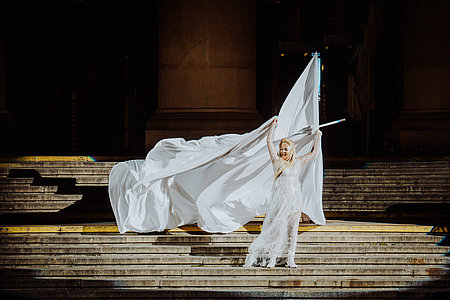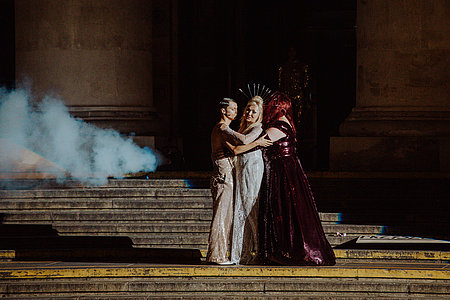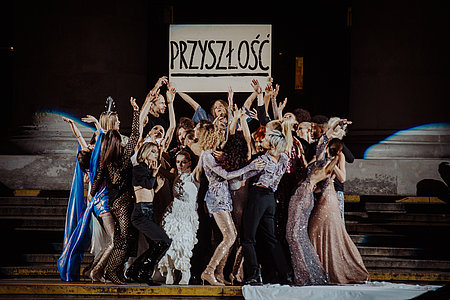In »Aria di Potenza«, three opera singers deliver a series of speeches by politicians who shape world events. At the culmination of each speech the singer then launches into song, performing an aria that communicates the main emotion within the speech (triumph, disappointment, attacking a political opponent etc.). So, for example, Angela Merkel’s speech »Wir schaffen das« (We can do this) moves seamlessly into Sarastro’s aria »In diesen heil‘gen Hallen« from Mozart’s »Magic Flute« ; Putin’s speech declaring war on Ukraine reaches its finale in Ortrud’s aria from Wagner’s »Lohengrin« (»Entweihte Götter!«). The juxtaposition of the selected speeches and arias illustrates the rhetorical techniques politicians use to manipulate voters’ emotions and also underlines how topical the opera repertoire is in terms of understanding the processes at work in contemporary politics. With direction by the internationally renowned Polish director Krystian Lada and design by Gosia Baczyńska, currently Poland’s most famous fashion designer, the project brings together a trio of opera stars: Lucia Lucas, the first trans singer to perform on German stages and internationally acclaimed heroic baritone, who made her debut at the Metropolitan Opera in March 2022. Małgorzata Walewska, the Polish dramatic mezzo soprano who is a regular guest at opera houses between New York, London, Tokyo and Geneva. And the French soprano Théo Imart, who has been highly praised by the critics for his roles at Theatre Basel and with Les Arts Florissants.
KONCEPT, DIRECTION & STAGE
Krystian Lada
LIGHT & STAGE
Aleksandr Prowaliński
COSTUME
Gosia Baczyńska
LIVE-ELECTRONICS
Rafał Ryterski
PIANO
William Kelley
SOPRANO
Théo Imart
HERO BARITONE
Lucia Lucas
MEZZOSOPRAN
Małgorzata Walewska
COPRODUKTION
Teatr Studio, Warschau, The Airport Society, KUNSTFEST WEIMAR
FUNDING
Kulturstiftung Thüringen, Goethe-Institut Warschau, Stiftung für deutsch-polnische Zusammenarbeit, Instytut Adama Mickiewicza


